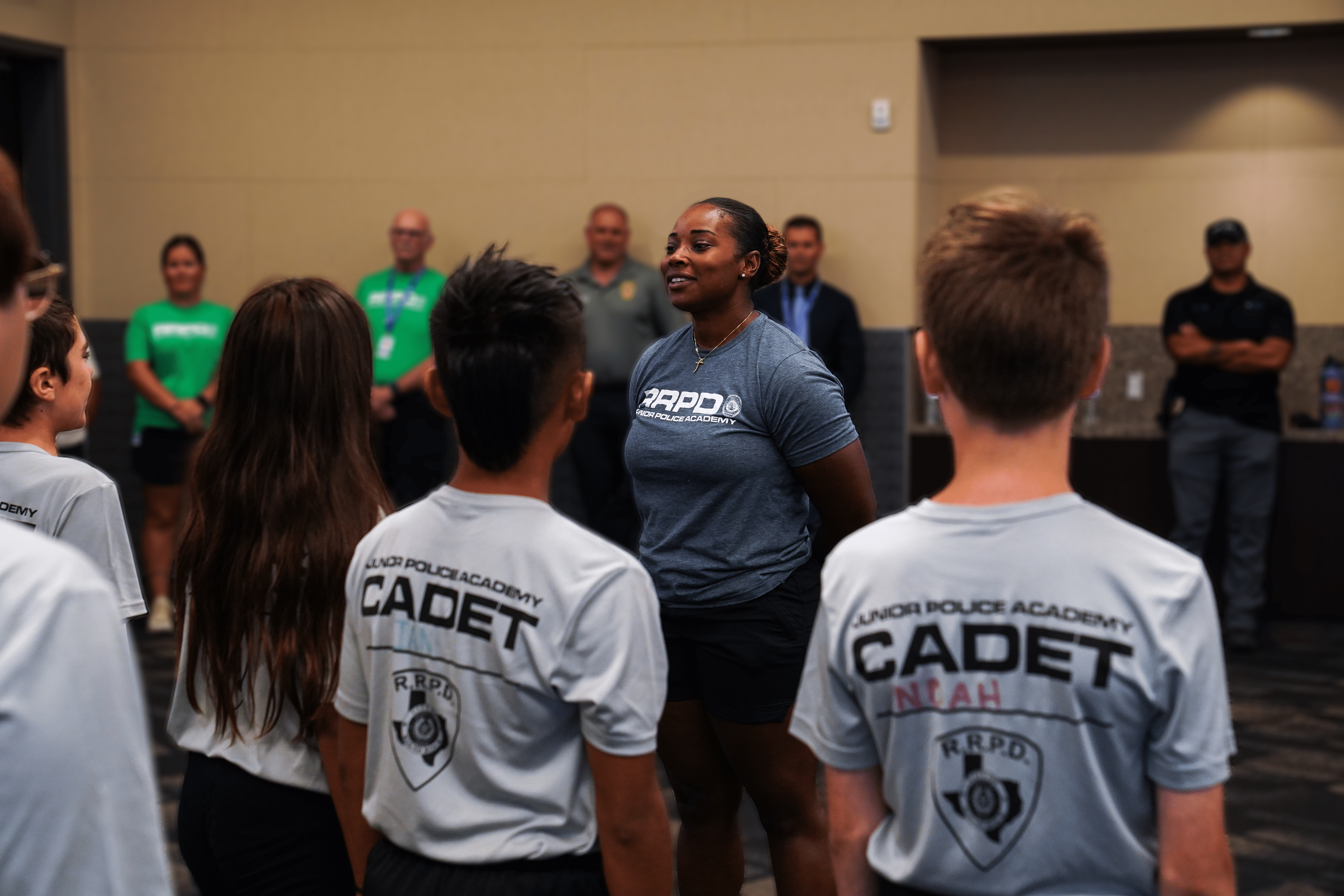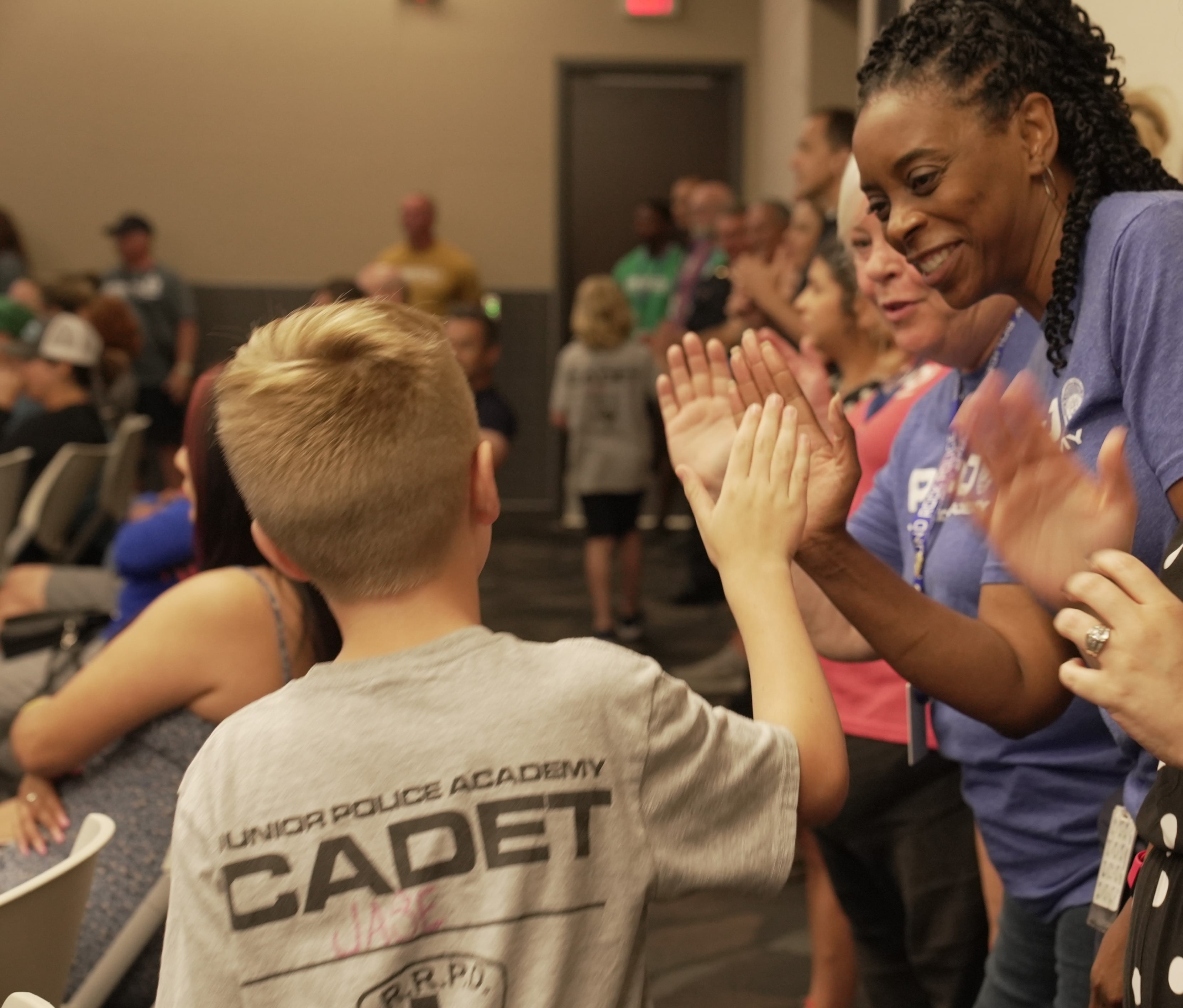Contact Us
To provide feedback on the Community Policing Dispatch, e-mail the editorial board at CPDispatch@usdoj.gov.
To obtain details on COPS Office programs, publications, and resources, contact the COPS Office Response Center at 800-421-6770 or AskCopsRC@usdoj.gov

U.S. Department of Justice
Office of Community Oriented Policing Services
Washington, DC 20530
Rappelling down a seven-story climbing wall might not appear to be the best method for law enforcement officers to build relationships with local youngsters, but this activity is a highlight of the Round Rock (Texas) Police Department (RRPD) Junior Police Academy (JPA). And according to RRPD Community Affairs Officer Earin Jackson, shown in the photo leading cadets through a JPA graduation ceremony, physical challenges like these can build self-confidence—one of JPA’s major goals.
The JPA, which consists of six one-week summer camps for boys and girls ages 8 to 14, was started as an enrichment program for underserved youth in this Central Texas town near Austin by Allen Banks when he became chief of RRPD in 2014. Since then, more than 1,000 Round Rock children have graduated from the JPA.
A Junior Police Academy with a Focus on Character Building
 The JPA curriculum focuses on relationships, character building and life lessons. Instruction is given by RRPD officers and staff members, allowing young people who may have negative attitudes toward police get to know them as caring adults.
The JPA curriculum focuses on relationships, character building and life lessons. Instruction is given by RRPD officers and staff members, allowing young people who may have negative attitudes toward police get to know them as caring adults.
Says Allen, “It’s important that kids don’t fear us, that they learn to trust us and understand that we are there to support them. We want them to know that we are not bad guys, that we are here to help them.”
An important part of the program is the guidance that young people get for making good choices in life. Said Banks, “We talk about life choices and situations, and if a child is acting up, the instructor explains how it affects other people, emphasizing consequences to positive and negative actions.”
Life Changing Guidance and New Experiences
“Applicants attending Title One schools receive priority in academy acceptance. And every one of my officers can tell these young people how they themselves grew up in similar neighborhoods but avoided becoming one of the drug, gun violence, or other sad statistics, and are now leading productive lives. Their message is, ‘even if your dad is in prison, you don’t have to go down that road. You can make a difference in your community, no matter where you grew up.’ We want to be role models,” he adds.
JPA also provides kids with a behind-the-scenes look at the different areas of a police department, so that they can learn what the police do, how they work, and what resources they offer to their families and community. This includes interactive segments, such as a SWAT demonstration in which the kids “rescue” a downed officer. In this activity, they learn the value of exercise, discipline, and overcoming one’s fears.
The youths’ horizons are broadened through other experiences, as well. Says Banks, “We introduce them to local businesses that partner with us and expose them to things they wouldn’t ordinarily be familiar with.
“We visit our semi-pro baseball club at Dell Diamond Baseball Stadium, which is the home stadium of the Round Rock Express, the Triple-A Minor League Baseball affiliate of the Texas Rangers. The kids love going on the field and into the locker room. They get to attend a game, too.”
Another popular experience is a visit from the Austin Police Department helicopter, which lands in front of the kids, who are then allowed to look inside it.
Activities that Instill Self-Confidence
Among the Academy’s many physical activities is rappelling. According to Jackson, though most kids take well to it, some are wary. “We encourage them to at least try, and when they overcome their fear and do it, they’re very proud of themselves.
“We had one child who didn’t have strong social skills and refused to participate in rappelling. But when one of the officers volunteered to come down with him, he agreed to do it.
“This enabled the boy to see he could accomplish things he didn’t think he was capable of. I saw him change after this. This experience gave him courage and self-confidence, and he came out of his shell socially, too.
“Another story that made an impact on me and everybody involved in the Academy was that of a girl of about 12 years old. One morning, her father was unable to drive her to our department, which is about three miles from her home. So, she ran all the way to the police department to get there on time, arriving gasping for breath. But she was in good spirits, not complaining about having to get to us on her own steam, just clearly excited to be there.
“That really touched everybody, and at the Academy graduation, we honored her as the top cadet in her class with a challenge coin. Her dad was at the ceremony and both she and her father were very appreciative. They even got a little teary.”
Positive Feedback from Parents
“We’ve kept in touch with her, as we have with other former cadets and their parents, who sometimes bring their children to the department for a tour or to give us brownies and other homemade treats. Some kids who’ve attended the Academy in years past come visit me in the department, and I often see JPA graduates when I’m out in the community,” said Jackson.

high-fiving a JPA cadet
“The parents are very supportive. We get a lot of positive feedback from them, saying that the Academy helped their child grow both physically and mentally. Many say they’ve seen positive changes in their kids—things like ‘I don’t have a hard time getting my kid to do chores anymore,’ or ‘he’s going to school regularly now,’ or ‘she’s showing more respect.’
Another thing I hear is ‘My son is spending time outside now, not just playing video games.’ I’ve also had kids who’ve graduated from high school tell me that this program helped them.”
According to Chief Banks, the department, which has long been involved in Special Olympics, has decided to expand JPA to an additional week, to include a session for 10 to 12 kids with special needs. To give these children the appropriate curriculum, RRPD is reaching out to the local school district and looking to recruit volunteers with special education backgrounds.
Investing in Future Workers, Managers and Community Leaders
Young people are a special interest of the Round Rock Police Department, and the Junior Police Academy is only one of the department’s youth-focused programs.
Prior to COVID, they hosted a back-to-school program, handing out free school supplies and offering free wellness, hearing, and eyesight checkups at Dell Stadium—an event that attracted 13,000 attendees but was halted because of the pandemic.
Said Banks, “Now that COVID has released its grip, we are replacing that event with a program called Step N2 Success. Through this program, we will provide new shoes to students who may not have the funds to buy them, providing them throughout their school years, starting in kindergarten. If they join the soccer, tennis, or football team, they will get cleats or other athletic shoes, as well. This is the first year for it, and we helped about 200 kids.
“We didn’t want this to be a big draw on the city budget, so we asked businesses in the area for donations to this and other programs, especially the youth-oriented ones. Our message to them is that the investment they make in these kids is an investment in their future workers and managers.
“The payoff for all of us is that in five, 10, or 15 years, we won’t be putting these kids in our squad car in handcuffs. They will be good, involved citizens.”
Echoed Earin Jackson, “Our youth is our future.”
Images courtesy of the Round Rock Police Department.
Faye C. Elkins
Sr. Technical Writer
COPS Office
Subscribe to Email Updates
To sign up for monthly updates or to access your subscriber preferences, please enter your email address in the Subscribe box.






